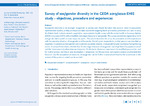Survey of sex/gender diversity in the GEDA 2019/2020-EHIS study – objectives, procedure and experiences
Pöge, Kathleen
Rommel, Alexander
Starker, Anne
Prütz, Franziska
Tolksdorf, Katharina
Öztürk, Ilter
Strasser, Sarah
Born, Sabine
Saß, Anke-Christine
Sex/gender diversity is increasingly recognised by society and should be taken into account more in populationrepresentative
studies, as they are important data sources for targeting health promotion, prevention and care. In 2019,
the Robert Koch Institute started a population-representative health survey with the study Health in Germany Update
(GEDA 2019/2020-EHIS) with a modified, two-stage measures of sex/gender. The survey covered sex registered at birth
and gender identity with an open response option. This article describes the aims, the procedure and the experiences
with the operationalisation of sex/gender and the results. Out of 23,001 respondents, 22,826 persons are classified as
cisgender, 113 persons as transgender and 29 persons as gender-diverse. 33 respondents were counted as having missing
values. A survey of interviewers showed that the two-stage measures of sex/gender had a high level of acceptance overall
and that there were only a few interview drop-outs. On the basis of previous experience, the modified query can be used
for further surveys, but should also be adapted in perspective. For this purpose, participatory studies are desirable that
focus on how the acceptance of measures of sex/gender can be further improved and how hurtful experiences in the
context of the questions asked can be avoided.
Files in this item

